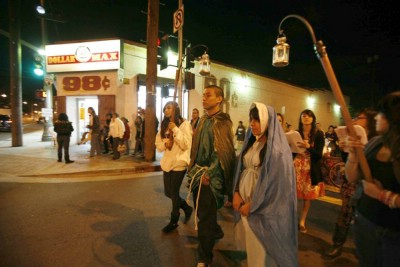|
.........
LAPD to keep its policy on immigration checks
Special Order 40 will continue
~~~~~~~~~~~~~~~~~~~~~~~~~~~~~~~~~~~~~~~~~~~~~~~~~~~~~~~~~~~~~~~~~~~~~~~~~~~~~~~~~~~~~
 |
 Dolores Mission Church's posada Dolores Mission Church's posada
( Francine Orr / Los Angeles Times ) |
|
LAPD to keep its policy on immigration checks
The new chief tells Latinos at a posada gathering that he will continue Special Order 40, which bars police from initiating action against people solely to discover their legal status.
by Teresa Watanabe
Los Angeles Times
December 20, 2009
On the plaza of Dolores Mission Church, long a sanctuary for illegal immigrants, a Roman Catholic priest asked the question that has hovered in the minds of so many of the city's migrants since Charlie Beck was appointed Los Angeles police chief.
Flanked by parishioners holding flickering votive candles in the cool evening air, Father Scott Santarosa asked Beck whether he could assure community members that they will not be asked about their immigration status if they report a crime.
" Sí," Beck said, drawing laughs and applause from the crowd.
|
| |
With that, Beck let it be known that he will continue to enforce Special Order 40, which prohibits police from initiating action against people solely to discover their legal status.
Beck spoke to more than 100 people Friday evening as they observed International Migrants Day with a posada , a traditional celebration that reenacts the journey of Mary and Joseph seeking lodging in Bethlehem.
"It is extremely important to build relationships with all the communities of Los Angeles," Beck told the crowd. "That cannot be done when people are afraid to have legitimate contact with police because of their status."
First established three decades ago by then-Police Chief Daryl Gates, the order came under fire last year when a star high school football player, Jamiel Shaw II, was shot dead, allegedly by an illegal immigrant. Critics, who say the order endangers public safety by coddling law-breaking immigrants, have failed in their efforts to amend it in courts, on the ballot and through the Los Angeles City Council.
Althea Shaw, Jamiel's aunt who is pushing for a new law requiring police to check known gang members' immigration status upon arrest, said she was disappointed by Beck's decision.
"Special Order 40 is protecting gang members who are here in the country illegally," she said. "It's handcuffing the police and endangering public safety."
Beck defended the order, saying it had helped reduce crime in the last eight years by encouraging illegal immigrants to step forward and report suspicious activity to police. But he also said officers would continue to alert authorities if they discovered a violent criminal's illegal status in the course of their investigations.
Asked why his approach differed from that used by Maricopa County, Ariz., Sheriff Joe Arpaio, who has aggressively pursued illegal immigrants under federal agreements allowing local law enforcement to act as immigration agents, Beck replied: "I don't do things for political reasons. I do things for the right reasons."
Among those present was Maria Elena Durazo, executive secretary-treasurer of the Los Angeles County Federation of Labor AFL-CIO, who praised Beck's outreach to the impoverished Boyle Heights immigrant community. She said former Chief William J. Bratton was respected by immigrant-rights groups for enforcing Special Order 40 and for taking quick action in investigating police conduct in a May Day melee at MacArthur Park two years ago.
"That he would take the time to reach out to an immigrant and poor community is a good omen for relationships, which I think will be very strong," Durazo said.
Beck said he intends to strengthen ties with immigrant communities and has designated Capt. Rigo Romero, a bilingual native of Mexico, as his liaison with the Latino community and Spanish-speaking news media. In a city where nearly half the population is Latino, many of whom don't speak English, Beck said he wants to make sure he is able to accurately communicate with them.
Romero said he hoped to give the chief a "real-life view" of how impoverished immigrants live.
One of 18 children who grew up in the Pico-Union neighborhood, Romero sold eggs before school to help the family make ends meet and personally witnessed the anguish of families whose parents or children had been deported. Romero said he wants to help Beck experience such worlds through community events like the Dolores Mission posada.
Participants in the procession, many bedecked in Santa hats, walked through the neighborhood carrying flickering candles. They drew parallels between Mary and Joseph's search for shelter and the plight of immigrants seeking safe harbor here. Many wore T-shirts saying in Spanish that "Jesus, Mary and Joseph were immigrants, not criminals."
Several people said crime has declined in the neighborhood, which they said was once plagued with eight or nine warring gangs.
Growing trust in police, aided by Special Order 40; citizen patrols; and new housing units with strict rules against gang members have all helped calm the area, they said.
"I think the order is crucial to the health of the community," said Jose Quintana, 21, a Loyola Marymount University student who ladled out steaming hot chocolate to parishioners. "It's important for them to know they won't be harassed or have their rights taken away for nothing." |
|
|
 |

|